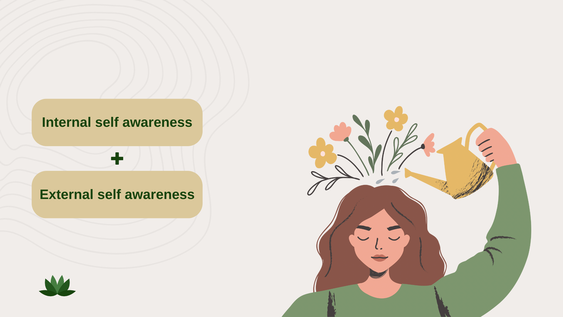|
Self awareness is defined as the skill of understanding our own behaviours, perceptions, emotions, and yearnings. Cultivating this critical skill enhances our self compassion, trustworthiness, and overall effectiveness. It also improves our relationships, empathy, and commitment. Surprisingly, research confers that self awareness is a rare quality among the general population. Based on research, only 10%–15% of the people studied fit the criteria. The good news is that we can cultivate such skills by following simple techniques shared below. But first let’s delve deeper into some interesting findings about self awareness in order to better understand it. There are two types of self awareness: internal and external. Internal self awareness:Internal self awareness is based on positive introspection of self. “Positive” refers to compassionate, inquisitive introspection divorced from judgement and debilitating criticism. Try to follow an internal locus of control to cultivate higher level of self awareness through understanding your own emotions and perceptions. That said, this requires a level of objectivity that might be hindered by unconscious thoughts, unresolved emotions, and motives. For this purpose, it is always helpful to seek the support of a trusted other or trained professional to bypass these blockages of the unconscious mind to avoid unnecessary analysis might lead to rumination, negative thoughts, and low self esteem. External self awareness:The other type of self awareness is external. It means taking an external locus of control to understand how other people perceive us, in terms of behavioural patterns, emotions, dreams and aspirations. People who know how others see them are more skilled at practicing empathy and taking others’ perspectives. They tend to have better relationships and more satisfaction with their life. Similarly, they tend to be more truthful, objective, and honest. You may also benefit from consulting a friend and seeking feedback from a trusted other such as a friend or a professional to provide you with honest perspectives. Combining the two halves:Ideally, we need to cultivate a balanced combination of both types; to be able to identify our own values, aspirations and behaviour (internal self awareness). Equally important is to practice a level of humility and compassion to request feedback on how others view us (external self awareness). This balance would eventually enhance self esteem, and decrease anxiety and depression. The problem is that the human mind rarely operates in a wise manner that ideally combines rational and emotional perspective. Hence, our judgments are seldom free from bias. We tend to confirm our biases without questioning their validity or value. We fall prey to our own contradictory evidence, and we force our thoughts to conform to our initial explanations. Why do we require external feedback? Because lack of balanced feedback leads to toxic overconfidence, overestimating our skills and abilities, and eventually disappointment and resentment with self and others. In summary, if you are thinking of improving your self awareness and overall happiness, you need to seek a balanced perspective of internal and external self awareness. Questions to help you build your self awareness:Take a minute to ask yourself the questions below. Work on answering them in writing. Ask a trusted loving other who has your best interest to answer the same questions about you separately and objectively (also in writing). Once they are done, request that they share their feedback with you candidly.
As you work on these questions, remind yourself to practice open mindedness, compassion to self and empathy to others. This exercise is meant to enhance your self awareness.
0 Comments
Leave a Reply. |
About OlaOla is a Registered Clinical Counsellor offering a holistic approach to healthy relationships, life transformation and fulfillment. |
|







